CETHERA Secures Development Support from Makerspace i7 for First Operational Prototype of the CTHR-01
- nikitabond941
- Jun 25, 2025
- 3 min read

Incheon, South Korea — May 2025

CETHERA has officially completed development of its first fully operational prototype of the CTHR-01 security framework with development support and engineering resources provided by Makerspace i7, an advanced engineering organization within Yonsei University.
The CTHR-01 prototype represents a major milestone for CETHERA’s vision of revolutionizing hardware-based cybersecurity. The CTHR-01 implements the proprietary QE-BCP cryptographic protocol and features an integrated Autonomous Cyber Immune System (ACIS) for real-time detection, isolation, and mitigation of evolving cyber threats. The prototype development phase validated the chip’s core cryptographic engine, memory subsystem, and communication layers, marking a complete proof-of-concept for eventual transition into a custom silicon ASIC.

The prototype was made possible through strategic engineering support, equipment access, and component-level sponsorship provided by Makerspace i7. This included not only lab space and tools for advanced embedded system development, but also a suite of electronics, computing, and communication components essential to developing the secure hardware infrastructure.
Resources Supplied by Makerspace i7 for CTHR-01 Development
The following equipment and components were supplied to enable end-to-end development and verification of the CTHR-01 prototype:
AMD Xilinx Zynq-7000 SoC ARM FPGA Development Board (XC7Z010) – The core platform used for FPGA implementation of the QE-BCP protocol and PCIe communication
STM32F429 Discovery Kit with STM32F429ZIT6 MCU – ARM Cortex-M4 microcontroller for testing secure communication, sensor-based threat triggers, and edge-level processing
FireBeetle ESP32-E IoT Microcontroller (DFR0654-F) + FireBeetle Board-M0 – Used for wireless communication and external threat emulation via Wi-Fi and Bluetooth
SparkFun Cryptographic Co-Processor (×2) – Hardware encryption offloading and comparative testing for FPGA-based cryptographic performance
W5500 TCP/IP Ethernet Module – Integrated for SPI-based Ethernet connectivity in secure transmission testing
J-Link EDU Mini Debugger + Target Ribbon Cable – Used for firmware flashing, JTAG interface debugging, and real-time signal analysis
Basys 3 FPGA Development Board (Artix-7 410-183) – Used in early-stage FPGA behavioral simulation and component-level testing
RPI-BC EXT-PCB HBUS SET (×3) – Used for modular extension, prototyping connections, and bus configuration testing
Adafruit 16-Channel PWM / Servo HAT for Raspberry Pi – Included for external actuation testing and system feedback integration
C289 microSDXC (2TB) – Employed for logging encrypted system data and external storage evaluation
DDR3 PC3-12800 CL11 4GB (1600MHz) – Low power SDRAM module for runtime benchmarking of memory performance
IC Three-Terminal Negative Voltage Regulators (×5) – Voltage control and signal conditioning for isolated hardware segments
Heat sink with mounting hardware – For thermal dissipation during FPGA high-load tests
Anti-static wrist straps (×2) – Ensuring safety during sensitive hardware assembly
Power Adapters and Wiring:
WN-05, WN-07, and WN-9B (10A/13A, 250V-rated adapters)
Power Adapter (BS-522: Input 100-240V~50/60Hz, Output 5V-2000mA)
High-speed USB cable, ALINX USB Cable (AL321), and 1 short KSM wire (10 ports, colored)
The embedded ST-LINK/V2-B, 3-axis MEMS sensors, 2.4” QVGA TFT LCD, and 64-Mbit SDRAM on the STM32F429 board were for testing auxiliary threat detection, sensor calibration, and secure system display modules.
Engineering Environment Provided by Makerspace i7

Beyond components, Makerspace i7 also offered high-grade engineering tools, oscilloscopes, soldering workstations, logic analyzers, and debugging environments, along with technical mentorship and prototyping workspace. These facilities enabled iterative testing, high-frequency signal tracing, and full system integration of the FPGA-based prototype.

The development of this prototype positions CETHERA as a front-runner in hardware-based quantum-resilient cybersecurity solutions. The CTHR-01 accelerator card is now ready to enter the next phase of certification, partner evaluation, and enterprise pilot deployment.

This achievement highlights how targeted resource support from institutions like Makerspace i7 can empower deep-tech startups to translate advanced cryptographic theory into market-ready secure computing solutions.




Comments